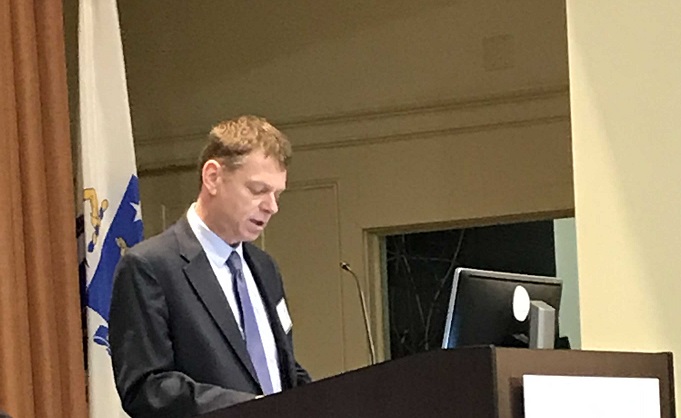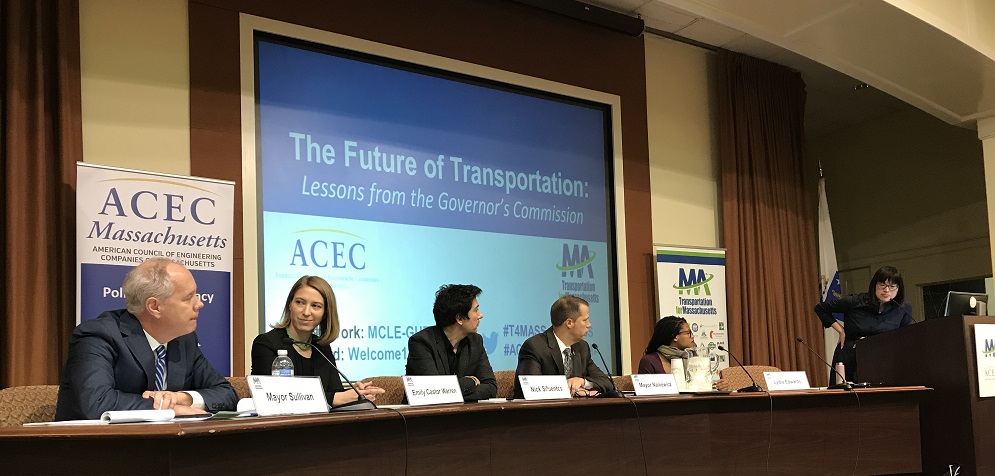ACEC/MA Government Affairs Update - January 3, 2019
2019-2020 Legislative Session Began on January 2, 2019
On January 2, 2019, the 2019-2020 Session of the Massachusetts legislature began with these steps:
- State Senator Karen Spilka (D-Ashland) was elected to her first full-term as Senate President. On a roll call vote, Senator Spilka received 33 votes to six votes for Republican Sen. Bruce Tarr. After the balloting was complete, Tarr moved that it be the "sense of the Senate" that Spilka's election as Senate president be declared unanimous. Senator John Keenan, who is traveling out of the country, is the only senator who did not vote, but indicated his support for Senator Spilka.
- State Representative Robert DeLeo (D-Winthrop), was reelected speaker of the Massachusetts House for a sixth time. DeLeo received 119 votes in the 160-member House, with Republican Minority Leader Brad Jones earning 31 votes from members of his GOP caucus. Eight Democrats, including 4 freshmen, broke with their colleagues and voted "present" -- Reps. Nika Elugardo of Boston, Tami Gouveia of Acton, Jonathan Hecht of Watertown, Russell Holmes of Boston, Patrick Kearney of Scituate, Maria Robinson of Framingham, John Rogers of Norwood and Angelo Scaccia of Boston.
- Both the Senate President and the Speaker of the House are expected to name their leadership teams, including Committee Chairs, in the next few days.
- New House members: 25 freshman legislators were sworn into the 160-seat House of Representatives on Jan. 2. Democrats begin the 191th General Court with 127 seats to the Republicans' 32 -- with one seat being held by Independent Rep. Susannah Whipps of Athol. The new House members are: David Biele of South Boston (Collins), Natalie Blais of Sunderland (Kulik), Peter Capano of Lynn (Crighton), Daniel Carey of Easthampton (Scibak), Michelle Ciccolo of Lexington (Kaufman), Marcos Devers of Lawrence (Matias), Mindy Domb of Amherst (Goldstein-Rose), Nika Elugardo of Jamaica Plain (Sanchez), Tami Gouveia of Acton (Atkins), Richard Haggerty of Woburn (Dwyer), Christopher Hendricks of New Bedford (Koczera), Patrick Kearney of Scituate (Cantwell), Kathleen LaNatra of Kingston (Calter), David LeBoeuf of Worcester (Campanale), Christina Minicucci of North Andover (DiZoglio), Liz Miranda of Roxbury (Carvalho), Tram Nguyen of Andover (Lyons), Norman Orrall of Lakeville (Keiko Orrall), David Robertson of Tewksbury (Miceli), Maria Robinson of Framingham (Walsh), Lindsay Sabadosa of Northampton (Kocot), Jon Santiago of Boston's South End (Rushing), Michael Soter of Bellingham (Kuros), Alyson Sullivan of Abington (Diehl) and Tommy Vitolo of Brookline (Smizik).
- New Senate members: Five new senators took the oath of office on Jan. 2. Democrats have 34 seats; Republicans have 6. The 5 new Senate members are: Jo Comerford of Northampton (Rosenberg), Diana DiZoglio of Methuen (O'Connor Ives), Barry Finegold of Andover (L'Italien), Edward Kennedy of Lowell (Donoghue) and Becca Rausch of Needham (Ross).
Actions at the End of the 2017-2018 Legislative Session
Massachusetts Passes Law Requiring Professional Engineers on Natural Gas Projects - Separate web page on this new law
State Budget Writers Agree on 2.7% Growth in State Tax Revenues: On December 31, 2018, state budget writers agreed to build their fiscal year 2020 budget plans on the assumption that state tax revenues will grow by 2.7% over FY2019, the current fiscal year. Governor Charlie Baker's budget chief and the leaders of the House and Senate Ways and Means Committees detailed a finalized accord on how much tax revenue the state expects to collect in fiscal year 2020, which begins on July 1. 2019, Budget watchers also upgraded their expectations for tax revenue in FY2019, upping the projected total revenue by $200M, to $28.529B. The estimate of $29.299B in tax revenues for FY2020 amounts to $770M more in revenue than the updated projection for FY2019. The projected growth rate will serve as the basis for Governor Baker's budget, which will by issued on January 23, starting the FY2020 budget process that will continue this spring and summer in the House and Senate.
Legislature Passes Short-term Rental Bill; Includes Water Protection Fund for Cape & Islands; Governor Signs It Into Law on 12/28/18: The new law is Chapter 337 of the Acts of 2018. This includes a 2.75% excise for the Cape Cod and Islands Water Protection Fund.
- The new law will apply the 5.7% hotel room tax to short term rentals, with an exemption for those who rent out their rooms for 14 days or less.
- Cities and towns can choose to add an additional 6% local excise tax (6.5% in Boston) and a 3% community impact fee, with an additional 2.75% fee levied on Cape Cod*.
- *Establishes a Cape Cod and Islands Water Protection Fund and establishes a 2.75% excise to be imposed on all accommodations (hotels/motels/bed & breakfast establishments/and short-term rentals) in Cape Cod municipalities subject to the Fund.
- There will be a public registry of all short-term rentals, however, municipalities will be allowed to place their own restrictions on short-term rentals, capping the total number of rentals, restricting the location of rentals or limiting for how many days rooms can be rented. Rentals will have to comply with local health and safety codes.
- Rental unit operators will have to maintain $1M in liability insurance coverage.
- The law will go into effect July 1, 2019.
State Plans Rule-making for New Clean Peak Energy Standard: On December 31, 2018, state energy officials announced that zero megawatt hours are being served by clean peak resources during peak load hours in Massachusetts, and outlined plans for a rule-making process to set the parameters of a new Clean Peak Energy Standard. To establish a baseline and facilitate new clean peak certificates in the new year, an energy law signed by Gov. Charlie Baker in August required the Department of Energy Resources, by Dec. 31, 2018, to determine the current percentage of kilowatt-hour sales to end-use customers from existing clean peak resources during peak load hours. The department also established the minimum standard percentage requirement for retail electricity suppliers in the 2019 compliance year at 0%. However, any clean peak resources with a commercial operation date on or after Jan. 1, 2019 that meets clean peak regulatory standards may be permitted to generate clean peak certificates that can be purchased in compliance year 2019 by retail electricity suppliers for use towards compliance requirements in 2020 or 2021, The department plans an informal stakeholder process to design the Clean Peak Energy Standard, with some early draft proposals preceding the filing of a draft regulation

ACEC/MA Senior VP Dennis Baker (WSP) at the T4MA + ACEC/MA 12/19 Program (photo credit: A. Goodman)

Panel at The Future of Transportation: Lessons from the Governor’s Commission, presented by T4MA & ACEC/MA. From left: Braintree Mayor Joe Sullivan, Emily Castor Warren ( Lime), Nick Sifuentes (Tri-State Transportation Campaign), Northampton Mayor David Narkewicz, Boston City Councillor Lydia Edwards, + moderator Shirley Leung (Boston Globe) (photo credit: A. Goodman)
ACEC/MA Co-Hosts First Look at Commission on Future of Transportation Report to Governor on December 19
The future of transportation in Massachusetts is multimodal, carbon-neutral, and equitable – or at least should be, according to the panelists at our recent event discussing
Choices for Stewardship, the highly-anticipated report released by the Governor’s Commission on the Future of Transportation. The report lays out a vision for mobility in the Commonwealth between today and 2040. (If you missed the event, you
can check out a recording of the livestream here!)
Speaking to a standing room-only crowd of more than 400, Commission Chair Steve Kadish and Commission member Ken Kimmell presented on the report recommendations with a particular focus on how we plan for the future in a changing climate. A panel featuring Northampton Mayor David Narkewicz, Braintree Mayor and MassDOT Board Member Joe Sullivan, Boston City Councilor Lydia Edwards, Executive Director of the Tri-State (NY/NJ/CT) Transportation Campaign Nick Sifuentes, and Senior Director of Policy & Public Affairs at Lime Emily Castor Warren shared their insights with moderator Shirley Leung as representatives of the sectors that are key to bringing about the transportation future Massachusetts deserves.
Here’s T4MA's take on three of the most important insights from the panel:
-- It’s about people. The phrase “move people, not vehicles” has long been a mantra for advocates and progressive planners, and many were gratified to hear it as the official policy focus for the Commonwealth moving forward. A people-centric approach to transportation starts with recognizing that, on a fundamental level, better transportation makes everything better. The difference between a good and bad transportation experience means stress, lost wages, missed appointments, and less time with family; for a region over time, it can mean a slowdown in growth and an exacerbation of inequities. Putting people at the center of our transportation planning and focusing on why transportation deeply matters to people, and their quality of life, positions us to make choices that benefit the most people in the most places.
-- Success does exist – and we can build on what’s working. Transportation bright spots do exist throughout the state. More communities are offering bike-share, testing elements of Bus Rapid Transit, or getting smarter on appropriately pricing driving and parking. City and state agencies are working together on improvements like transit signal priority and accelerated bridge improvements. Transportation leaders are active in every community, and many never set foot in the State House. When we look to the future of transportation, we aren’t starting from square one, and we should build on best practices here and in other places – even in the face of attractive but untested technology options that promise to solve many of our problems.
-- We need to break down barriers and old thinking. People are going to more places in more ways than ever before, creating a need for new and creative partnerships with the public and private sectors, and at various levels of government. Some of this is due to new technology – e-scooters, TNCs (transportation network companies), and autonomous vehicles are certainly testing the limits of state regulations and current street design. But larger forces are in play, such as the evolution away from the traditional 9-5 workday, which calls into question the current structure of our commuter rail system and the need for tolls to be a fixed price, all day every day. Future needs for transportation will be flexible, and our policies should be, too.
We’ll be drawing on these lessons in the year ahead as we advocate for better and smarter transportation policies statewide.
ACEC/MA is grateful to Transportation for Massachusetts for the opportunity to co-sponsor this event and to the members of the Commission, whose report includes a set of 18 recommendations and excellent set of background material.
- - - - - -
The Commission on the Future of Transportation was established almost a year ago by Governor Baker’s Executive Order No. 579.
The Commission developed 18 recommendations to guide Commonwealth transportation policy “so that Massachusetts can benefit from coming changes – including in demographics, technology, and mobility preferences – and build a future for all of us that is healthy, sustainable, and prosperous.”
Link to report of the Commission – Choices for Stewardship: Recommendations to Meet the Transportation Future: https://www.mass.gov/orgs/commission-on-the-future-of-transportation. A second volume containing extensive background materials, supporting data, and valuable sources of information accompanies the report.
9 States and D.C. to Design Regional Approach to Cap Greenhouse Gas Pollution from Transportation
Transportation and Climate Initiative aims to complete design process before end of 2019.
On 12/18, a coalition of nine Northeast and Mid-Atlantic states, including Massachusetts, and the District of Columbia announced their intent to design a new regional low-carbon transportation policy proposal that would cap and reduce carbon emissions from the combustion of transportation fuels, and invest proceeds from the program into low-carbon and more resilient transportation infrastructure.
Link to more: http://bit.ly/CapGG-Transpo


